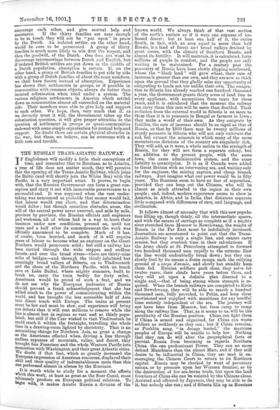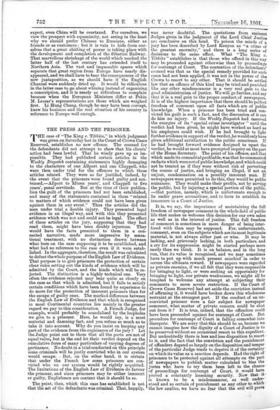tab RUSSIAN TRANS-ASIATIC RAILWAY.
1 F Englishmen will modify a little their conceptions of 1 time, and remember that to Russians, as to Asiatics, a year of life does not matter much, they will perceive that the opening of the Trans-Asiatic Railway, which joins the Baltic (and will shortly join the White Sea) with the Pacific, is a very important event. It proves, to begin with, that the Russian Government can form a great con- ception and carry it out with immovable perseverance to a successful end. It was supposed when the vast under- taking was announced as probable that money would fail, that labour would rim short, and that determination *ould falter ; but though countless obstacles arose, the will of the central power never swerved, and mile by mile, province by province, the Russian officials and engineers and workmen, all of whom had in a way to learn their business under new conditions, pressed on, until ten years and a half after its commencement the work was officially announced to be complete. Much of it has, of course, been hurried, and much of it will require years of labour to become what an engineer on the Great Northern would pronounce solid ; but still a railway has been carried through the wide steppes and endless forests, and over the broad rivers—there are thirty-nine miles of bridges—and through the thinly inhabited but amazingly broad valleys of Siberia, on to Vladivostock and the shore of the Northern Pacific, with nb break save at Lake Baikal, where mighty steamers, built to break ice, carry the train bodily for forty Miles. Americans would be proud of such a • feat, and we do not see why the European jealousies of Russia should prevent a frank acknowledgment that she has added much to the power of communicating within the world, and has brought the less accessible half of Aiia into direct touch with Europe. The trains at present must be few and must be slow, and experience will bring out defects that it will cost millions to remove while the line is almost lost in regions so vast and so thinly popu- lated; but still if the Czar wished to visit Vladivostook he could reach it within the fortnight, travelling the whole time in a drawing-room lighted by electricity. That is an astonishing change for Northern Asia, as great a change as the Americans effected when, driving a line through endless expanses of mountain, Valley, and desert,-they- brought San Francisco and the whole Western Pacific into connection with Washington and their great Atlantic cities. We doubt if that feat, which so greatly increased the European impression of American resources, displayed their skill and their quality of indomitableness more than this one performed almost in silence by the Russians. It is worth while to study for a moment the effects which this work, at least as great as the Suez Canal, must ultimately produce on European political relations. To begin with, it makes Asiatic Russia a division of the known world. We always think of that vast section of the earth's surface as if it were one expanse of ice- bound desert; but at least one half of it, the entire South, in fact, with an area equal to more than half Russia, is a land of forest and broad valleys drained by great rivers, with the climate of Southern Russia, and almost its fertility. It will maintain, it is calculated, forty millions of people in comfort, and the people are only waiting to be maintained. For a century past the peasantry of Russia have been slowly slipping southward, where the " black land " will grow wheat, their rate of increase is greater than our own, and they are now so thick upon the ground that they gladly seize any opportunity of emigrating to lands not too unlike their own. The emigra- tion to Siberia has already reached one hundred thousand a year, the Government grants thirty acres of land free to every applicant, with exemptions from taxes for three years, and it is calculated that the moment the railway can carry them this rate will be more than doubled. Their seclusion from the external world in Siberia is no more to them than it is to peasants in Bengal or farmers in Iowa ; they make a world of their own. As they emigrate by families, the rate of increase should be as rapid as that of Russia, so that by 1950 there may be twenty millions of sturdy peasants in Siberia who will not only cultivate the soil, but extract the minerals in which many of the more mountainous divisions of the country are singularly rich. They will add, as it were, a whole nation to the strength of Russia, for they will not form a separate colony, but an addition to the present people, with the same laws, the same administrative system, and the same liability to conscription. It is as if Canada were added to Great Britain with no intervening sea, and waiting only for the engineer, the mining captain, and cheap branch railways. Just imagine what our power would be in fifty years. The Russians seem to have no fear of separation, provided they can keep out the Chinese, who will be almost as much attracted to the region as their own people ; and, indeed, modern experience seems to show in America, in Africa, and in India that distances separate little compared with differences of race, and language, and civilisation.
It follows almost of necessity that with this new popula- tion filling up, though thinly, all the intermediate spaces, and with the means of carriage as complete as if a mighty river stretched from Moscow to Newchwang, the weight of Russia in the Far East must be indefinitely increased. Journalists are accustomed to point out that the Trans- Asiatic Railway is only a single line, and cannot carry armies, but they overlook time in their calculations. If the Army chiefs at St. Petersburg attempted to forward two hundred thousand men rapidly to the extreme East the line would undoubtedly break down ; but they can slowly feed by its means a dozen camps, each the rallying ground of a corps d'oftmee, and slowly but steadily keep them fed. Russian soldiers pack close, they serve for twelve years, their chiefs have years before them, and they will act upon a definite plan directed to a single end,—that .of being strong where strength is re- quired. When the branch railways are completed to Kirin and Newchwang, they will be able to march a hundred thousand men, fully provided, to Pekin, and keep them provisioned and supplied with munitions for any needful time entirely independent of the sea. The journey will not have been from Moscow, but from camp to camp along the railway line. That, as it seems to us, will be the peculiarity of the Russian position. China can fight them if .China is armed and organised, for China can waste soldiers as recklessly as they can ; but if China, remains, as Pushkin sang, " in dotage buried," the maritime peoples of Europe will be unable to help her. Nothing that ,the,y can do will alter the geographical facts or prevent Russia from becoming as regards Northern China the one predominant Power. They can no more defend Manchuria than the planet Mars, and if they still desire to be influential in China, they are mad in en- couraging the Chinese Court to return to its Northern capital. Russia may be checked by want of pecuniary means, or by pressure upon her Western frontier, or by the destruction of her sea-borne trade, but upon the land frontiers of China she can be resisted by the Chinese alone. Assisted and officered. by Japanese, they may be able to do it, but nobody else can; and if Siberia fills up as Russians expect, even China will be overtaxed. For ourselves, we view the prospect with equanimity, not seeing in the least why we should prefer Chinese to Russians, either as friends or as "customers ; but it is vain to hide from our- selves that a great shifting of power is taking place with the development and completion of the Siberian Railway. That marvellous shrinkage of the world which marked the latter half of 'the last century has extended itself to Northern Asia. The vast and impassable spaces which separate that great region from Europe have nearly dis- appeared, and we shall have to bear the consequences of the new juxtaposition, as we should have if the English Channel were suddenly dried up. It would be ridiculous in the latter case to go about whining instead of organising a 'conseription, and it is nearly as ridiculous to complain because when the European Ministers' differ at Pekin M. Lesser's representations are those which are weighed first. Li Hung Chang, though he may have been corrupt, knew his business and the real situation of his country in reference to Europe well enough.



























































 Previous page
Previous page